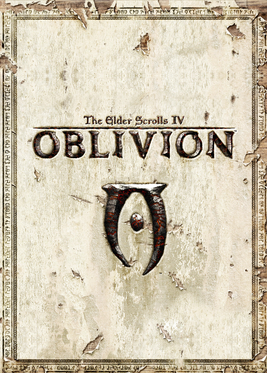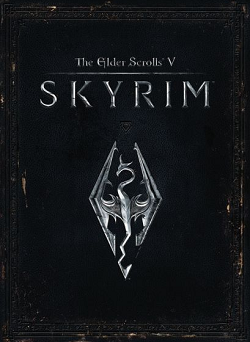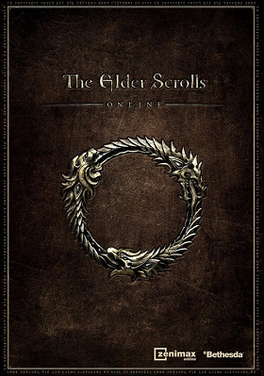An editor has nominated this article for deletion. You are welcome to participate in the deletion discussion , which will decide whether or not to retain it. |
The Elder Scrolls is a series of video games. The term may also refer to:
The Elder Scrolls is a series of action role-playing video games primarily developed by Bethesda Game Studios and published by Bethesda Softworks. The series focuses on free-form gameplay in an open world. Most games in the series have been critically and commercially successful, with The Elder Scrolls III: Morrowind (2002), The Elder Scrolls IV: Oblivion (2006) and The Elder Scrolls V: Skyrim (2011) all winning Game of the Year awards from multiple outlets. The series has sold more than 59 million copies worldwide.

The Elder Scrolls III: Bloodmoon is the second expansion pack for the 2002 video game The Elder Scrolls III: Morrowind, developed by Bethesda Game Studios and released for Windows in 2003. The expansion was later released as part of the Morrowind: Game of the Year Edition for the Xbox in 2004. The expansion adds a landmass to the game, Solstheim, a setting modelled on Norse mythology. The primary questline of Bloodmoon involves the investigation of the Bloodmoon Prophecy that foretells the return of the demigod Hircine. A secondary features a new faction, the East Empire Company, which tasks the player to establish a mining colony. Bloodmoon also provides the player with the ability to become a werewolf, a feature closely embedded in the main storyline and quests. The expansion features more detailed environments, including weather shaders such as snowfall and blizzards.

The Elder Scrolls III: Morrowind is a 2002 action role-playing game developed by Bethesda Game Studios and published by Bethesda Softworks. It is the third installment in The Elder Scrolls series, following 1996's The Elder Scrolls II: Daggerfall, and was released for Microsoft Windows and Xbox. The main story takes place on Vvardenfell, an island in the Dunmer province of Morrowind, part of the continent of Tamriel. The central quests concern the demigod Dagoth Ur, housed within the volcanic Red Mountain, who seeks to gain power and break Morrowind free from Imperial reign.

The Elder Scrolls IV: Oblivion is a 2006 action role-playing game developed by Bethesda Game Studios, and co-published by Bethesda Softworks and 2K Games. It is the fourth installment in The Elder Scrolls series, following 2002's The Elder Scrolls III: Morrowind, and was released for Microsoft Windows and Xbox 360 in 2006, followed by PlayStation 3 in 2007. Taking place within the fictional province of Cyrodiil, the game's main story focuses on the player character's efforts to thwart a fanatical cult known as the Mythic Dawn that plans to open portal gates to a demonic realm known as Oblivion.

Jeremy Soule is an American composer of soundtracks for film, television, and video games. He has composed soundtracks for over 60 games and over a dozen other works during his career, including The Elder Scrolls, Guild Wars, Icewind Dale, and the Harry Potter series.

Todd Andrew Howard is an American video game designer, director, and producer. He serves as director and executive producer at Bethesda Game Studios, where he has led the development of the Fallout and The Elder Scrolls series. He was also the game director for Starfield.
Reaver or Reavers may refer to:

The Elder Scrolls V: Skyrim is a 2011 action role-playing game developed by Bethesda Game Studios and published by Bethesda Softworks. It is the fifth main installment in The Elder Scrolls series, following The Elder Scrolls IV: Oblivion (2006), and was released worldwide for Microsoft Windows, PlayStation 3, and Xbox 360 on November 11, 2011.

Creation Engine is a 3D video game engine created by Bethesda Game Studios based on the Gamebryo engine. The Creation Engine has been used to create role-playing video games such as The Elder Scrolls V: Skyrim, Fallout 4, and Fallout 76. A new iteration of the engine, Creation Engine 2, was used to create Starfield. The Creation Engine has been tailor-made for large-scale open-world RPGs.

SureAI is a German team of video game developers, best known for creating several total conversion mods of Bethesda Softworks' The Elder Scrolls and Fallout series.

The Elder Scrolls Online, abbreviated ESO, is a massively multiplayer online role-playing game (MMORPG) developed by ZeniMax Online Studios and published by Bethesda Softworks. The game is a part of the Elder Scrolls series. It was released for Windows and macOS in April 2014, for PlayStation 4 and Xbox One in June 2015, and for PlayStation 5 and Xbox Series X/S in June 2021.

The Elder Scrolls V: Skyrim – Dragonborn is the third and final add-on for the action role-playing open world video game The Elder Scrolls V: Skyrim. It was developed by Bethesda Game Studios and released by Bethesda Softworks on the Xbox Live Marketplace on December 4, 2012. The Microsoft Windows version was released on February 5, 2013, and the PlayStation 3 version was released on February 12, 2013.

Nexus Mods is a website that hosts computer game mods and other user-created content related to video game modding. It is one of the largest gaming mod sites on the web, with 30 million registered members and 1733 supported games as of June 2022, with a single forum and a wiki for site- and mod-related topics.
Mark Nelson is an American video game designer and humor writer best known for his work with Bethesda Game Studios and the game series The Elder Scrolls. In March 2007, he joined computer games company Big Huge Games to create a new role-playing game, joining industry veteran Brian Reynolds and long-time collaborator Ken Rolston.

OpenMW is a free and open-source game engine recreation that reimplements the one powering Bethesda Softworks' 2002 open-world role-playing game The Elder Scrolls III: Morrowind.
The Elder Scrolls Renewal Project (TESRenewal) is a fan volunteer effort to recreate and remaster the video games in The Elder Scrolls series. The team is best known for its Skywind project, which seeks to recreate the 2002 The Elder Scrolls III: Morrowind on the 2016 The Elder Scrolls V: Skyrim: Special Edition game engine, known as the Creation Engine.
"Dragonborn" is the theme song for the soundtrack of the 2011 role-playing video game The Elder Scrolls V: Skyrim from Bethesda Softworks, composed by the American composer Jeremy Soule. The composition is Nordic-influenced classical in style and features a chorus singing lyrics in a fictional language, Dragon-tongue, that was created by Emil Pagliarulo for the game. The composition borrows heavily from "Nerevar Rising", the theme from The Elder Scrolls III: Morrowind, as well as elements from music in The Elder Scrolls IV: Oblivion, both of which were also composed by Soule. "Dragonborn" was lauded by critics and audiences alike. It is featured in orchestral performances and spawned numerous covers, many of which combine the song with an in-game, English-language composition "The Dragonborn Comes". One such cover, by Lindsey Stirling and Peter Hollens, holds the Guinness World Record for most viewed cover version of a video game soundtrack.